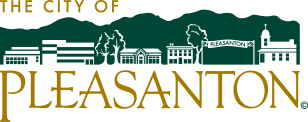Commercial Garbage & Recycling
Garbage and recycling management is a vital aspect of maintaining a clean and sustainable city. Implementing efficient waste disposal systems and promoting recycling initiatives play a pivotal role in preserving the environment and fostering a healthier, greener community for all residents.
Responsible business garbage and recycling practices are key to reducing environmental impact, fostering sustainability and showcasing corporate responsibility.
View Multifamily and Commercial Garbage Rate Sheet
For Additional City Support
If you require further assistance about garbage, recycling, local drop-off locations & more, call (925) 931-5500

Need Service? Contact Pleasanton Garbage Service to start your service.
For questions about recycling, billing, missed pick-ups and questions about the Pleasanton Transfer Station:
Call (925) 846-2042
Visit www.pleasantongarbageservice.com
Construction & Demolition Debris
- Ordinance 1992 – An Ordinance Adding Chapter 921 to the Pleasanton Municipal Code regarding Construction and Demolition Debris
- Construction and Demolition Debris Recycling Requirements – Effective November 1, 2009
Commercial Recycling
Together, let’s make a positive impact on the environment and create a greener, more sustainable future for generations to come. Start recycling now and be part of the solution!
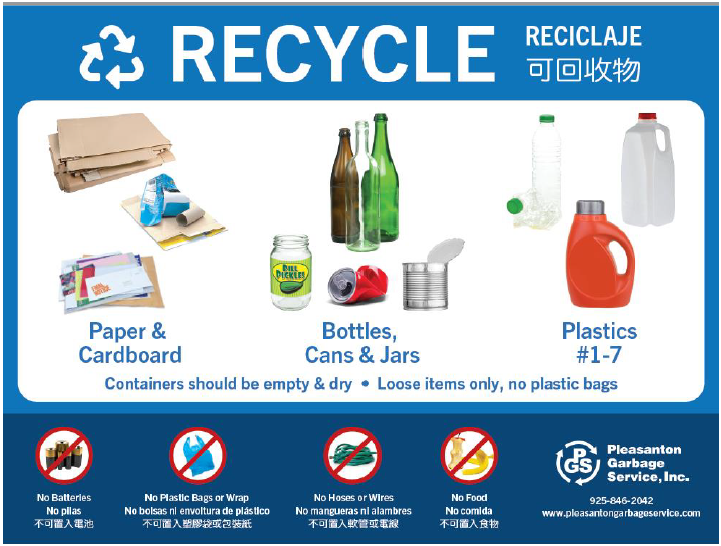
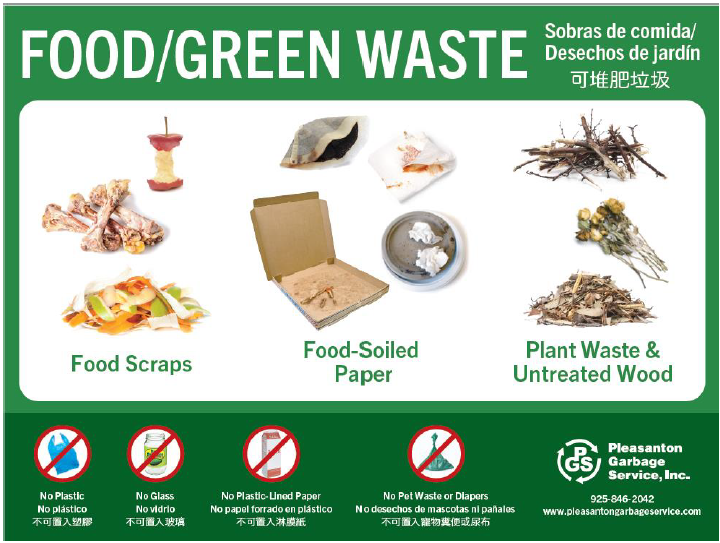
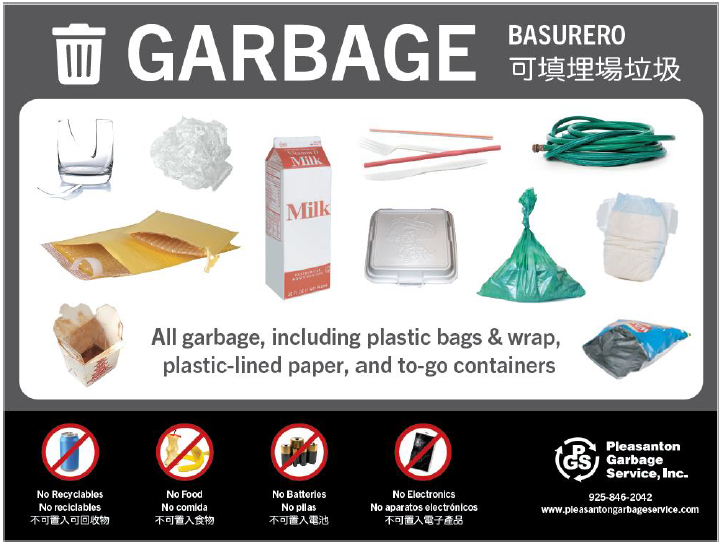
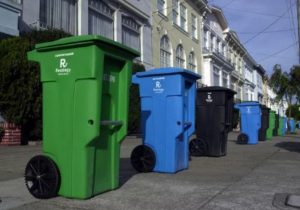
Recycling Sort Guides
For more information about SB 1383 and the Organics Reduction and Recycling Ordinance visit www.StopWaste.org/Rules (English) or www.StopWaste.org/Rules-Languages (Chinese, Korean, Spanish, Vietnamese).
FAQs
SB 1383 Requirements for Businesses and Multi-Family Properties
- Provide color coded and labeled indoor food and plant waste (compost) and recycling containers wherever there is a garbage bin (not required in the restroom) Bins are to be color-coded using blue for recycling, green for food and plant waste and gray or black for garbage.
- Sort materials into the proper bins.
- Compost: Food scraps, compostable paper and plant waste
- Recycling: Cardboard, paper, bottles and cans
- Do not place garbage into the compost or recycling bins
- Educate employees, contractors, tenants and students about the law at least annually. Tenants must be informed of the rules no later than 14 days after move-in and at least 14 days before move-out.
- Periodically inspect bins and provide feedback to employees, tenants and contractors about incorrectly placed items.
Self-haul, Back-haul or Shared Collection Service
Businesses that self-haul, back-haul, or share collection service with a neighboring business must document their alternative arrangements and request a Certification of Recycling Services (CRS). For details visit www.StopWaste.org/Rules.
More information for Commercial businesses, click here.
SB 1383 Requirements for Edible Food recovery
What is edible food?
Edible food is food intended for people to eat, including food not sold because of appearance, age, freshness, grade, surplus, etc. Edible food includes, but is not limited to, prepared foods, packaged foods and produce. All edible food must meet the food safety requirements of the California Retail Food Code (PDF).
As part of the new SB1382 law, certain food generating businesses* that are defined as either a “Tier 1” or “Tier 2” edible food generators must donate surplus edible food to feed people instead of composting it. Click here for more information and to find a list of Food Recovery Partners available to pick up or receive surplus edible food from Alameda County businesses and institutions.
*Tier 1 sites that must start surplus food donation by 1/1/22: large supermarkets ($2M+ gross annual sales), grocery stores (>10,000 sq. ft.), food service providers, food distributors and wholesale food vendors. Tier 2 sites that must start surplus food donation by 1/1/24: large health facilities (100+ beds), hotels (200+ rooms), large venues and special events (2,000+ individuals per day), restaurants (>5,000 sq. ft. or 250+ seats), state agency facilities and public schools.
- By January 1, 2022: Large supermarkets, grocery stores (>10,000 sq. ft.), food service providers, food distributors and wholesale food vendors must donate surplus edible food (Tier 1 generators)
- By January 1, 2024: Large health facilities (100+ beds), hotels (200+ rooms), venues, event spaces, restaurants (.5,000 sq. ft. or 250 seats) , state agency facilities and schools must donate surplus edible food.
To find out if the food donation requirements apply to your site and for more information on generator thresholds and resources visit www.StopWaste.org/Rules-Food-Recovery.
For a list of Food Recovery Organizations and Services available in in Alameda County visit Food Recovery Organizations and Services | RE:Source (www.StopWaste.org)
Waivers
There are two types of waivers available. Sites with an approved waiver will not be required to subscribe to recycling and/or food and plant waste (compost) service (or divert those materials to the landfill) for a five-year period. City had the option to waive collection requirements entities under very specific circumstances. A waiver may be issued for a five-year period.
- De Minimis Waiver- Generator must produce less than 10 gallons of organic waste subject to collection in a blue bin or a green bin per week: approximately 1 tall kitchen bag
- Physical Space Constraint- business or property owner that lack adequate space to provide a three required 3-bins. Businesses and property owners must demonstrate the existence of space constraints and that they cannot be addressed through downsizing containers, increase frequency of service, or through other solutions, Verification must be provided by Pleasanton Garbage Service, or City Staff.
To find additional information and the waiver application go to www.StopWaste.org/Rules-Waivers.
More Information
For more information about SB 1383 and the Organics Reduction and Recycling Ordinance visit www.StopWaste.org/Rules (English) or www.StopWaste.org/Rules-Languages (Chinese, Korean, Spanish, Vietnamese).
Technical Assistance
Free support is available to help you determine collection service needs, set up indoor color-coded and labeled bins, establish a food donation program, train staff and tenants and provide other waste reduction support.
To request free phone, virtual or in-person assistance, complete StopWaste’s request form at www.StopWaste.org/Request-Help.
Free Indoor Green Bins
To make separating food scraps, food-soiled paper and plant debris easier, StopWaste is offering free containers and lids for the indoor areas of businesses and common areas of multifamily properties. Up to $500 is available per approved site to choose from over 25 container and lid options, offered by two partner vendors.
To apply, visit www.Stopwaste.org/Rules-Resources.
Additional Resources
StopWaste offers free bin labels, a sign-maker tool, training videos and other useful materials to help businesses and multifamily properties comply with the law. Request or download materials at www.StopWaste.org/Rules-Resources.
Visit www.StopWaste.org/Rules-Languages for information about the new law in Chinese, Korean, Spanish and Vietnamese.
Franchise Agreement with Pleasanton Garbage Services
SB 1383 requires the City to implement garbage Collection programs, meet Processing Facility requirements, conduct contamination monitoring, provide education, maintain records, submit reports, monitor compliance, conduct enforcement and fulfill other requirements; and, the City has chosen to delegate these waste collection responsibilities to Pleasanton Garbage Services through a Franchise agreement with Pleasanton Garbage Services.
The resolution and full agreement can be found here:
Resolution and Franchise Agreement with Pleasanton Garbage Services.
